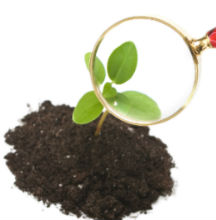Striving for a yard free of all insects, diseases, and weeds is both unrealistic and unwise. Many insects are beneficial, helping to keep pests under control naturally. Others simply coexist with humans, causing us no harm. Most insects found around our yards are harmless and may even be of benefit to us. While many of us can recognize the value in lady beetles and praying mantids, there are many other beneficial insects that can help keep true yard pests at bay.
Increasingly, individuals and communities are successfully managing pests and reducing the use of pesticides and protecting beneficial insects by putting in place a plan known as Integrated Pest Management (IPM). This approach that includes prevention, monitoring, pest identification, treatment selection, and proper application of pesticides. By following these steps, you can let nature do much of the work and help reduce the use of pesticides.
There are many tactics that homeowners can use to reduce the use of pesticides in the home landscape. When evaluating potential pest problems in the home garden and landscape, keep an open mind – pests are not the only cause of plant problems. Abiotic, or nonliving, factors are also common causes of plant decline and death.
If you are considering a pesticide application in the home landscape, remember that pesticides should be the last line of defense and pesticides should be used only when alternative approaches cannot reduce the problem to an acceptable level. The pesticide label will tell you what amount to use for different target sites. Never use more than the label says. Overuse can injure plants and harm beneficial insects. In fact, if the label shows a range for the amount of pesticide to use, you should use the least amount listed.
Accurate diagnosis of any pest problem is key to implementing this plan. The Loudoun County Cooperative Extension offers valuable information on determining what pest or problem is present – and beyond – through the Help Desk and Garden Clinics. Staffed by trained Loudoun County Extension Master Gardener volunteers, residents may call, visit, or e-mail with their yard and garden questions. Volunteers will supply the latest research-based information. For more information, click the link here: Help Desk.
And remember that good planting and maintenance practices – mulching with organic materials, appropriately removing dead and diseased plant material, and planting the right plant for the right place – promotes healthy, attractive plantings that reduces the likelihood of endangering water quality while enhancing your property.
Spotlight: Lawn Care Tips – Weeds and Pests from EPA
My Backyard Measurers for Scorecard
- Learn to identify five beneficial insects that provide natural control of harmful pests. Credit = 2 inches
- Avoid routine applications of pesticides. Treat only affected areas rather than spraying your entire lawn or yard. Remember, when using pesticides, the label is the law, follow it. Credit = 4 inches
- Wherever possible use non-chemical approaches to pest control; cultural controls such as pruning of affected areas, hand-removing insects and clearing away diseased debris are all ways to reduce pest populations naturally. Credit = 2 inches
- Use lower toxicity pesticides such as horticultural oils, insecticidal soaps, and biological controls first. These effective, safe materials can control most plant pests. Credit = 2 inches



